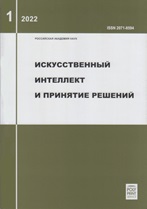|
|
Artificial Intelligence and Decision Making, 2014, Issue 3, Pages 72–84
(Mi iipr367)
|
 |
|
 |
Intelligent systems and technologies
Analysis of complex linguistic objects based on fuzzy estimation models
V. V. Borisova, S. N. Andreevb, Ya. A. Fedulova
a National Research University "Moscow Power Engineering Institute" in Smolensk
b Smolensk State University
Abstract:
In the paper the relevance of building fuzzy estimation models (fuzzy similarity models) aimed at solving a wide scope of linguistic problems under conditions of uncertainty is outlined. Classification of fuzzy similarity models depending on the type of characteristics aggregation is proposed and analysis has been carried out. Fuzzy similarity models have been developed; different approaches to solving problems of linguistic analysis using these models are suggested.
This paper deals with some issues of building fuzzy models within the third approach, using as example fuzzy models for the estimation of similarity of linguistic objects. Such models usage makes the basis for solving several problems of linguistic analysis including those viewed in this paper: estimation of the degree of similarity of the original text (poem) and its translations using different groups of characteristics; estimation of the similarity of parts of the compared poems (chapters); classification of texts and their features according to certain rules.
This paper contains the results of the texts estimation of the original poem by Coleridge “The Rime of the Ancient Mariner” and its two translations by N. Gumilev and W. Levik.
Keywords:
linguistic analysis, fuzzy estimation (similarity) model.
Citation:
V. V. Borisov, S. N. Andreev, Ya. A. Fedulov, “Analysis of complex linguistic objects based on fuzzy estimation models”, Artificial Intelligence and Decision Making, 2014, no. 3, 72–84
Linking options:
https://www.mathnet.ru/eng/iipr367 https://www.mathnet.ru/eng/iipr/y2014/i3/p72
|

|




 Contact us:
Contact us: Terms of Use
Terms of Use
 Registration to the website
Registration to the website Logotypes
Logotypes








 Citation in format
Citation in format 